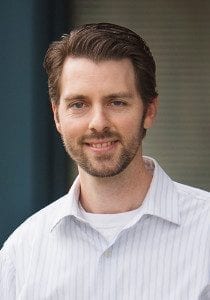Area mental health counselor offers some basic keys for success to achieving those goals
“The definition of insanity is doing the same thing over and over and expecting different results.’’
First of all, it’s not the actual definition of insanity. More accurately, it’s one of the most well-known cliches of all time. It’s often attributed to Albert Einstein, but that is also widely disputed. But, as I sit here on Jan. 3, the cliche resonates with me.
I enter this calendar year (2018) at the age of 54 years. And, like many — if not most — of you, I do so with some recurring anxiety. It’s the start of a new year. It’s that time when I must deal with the many things in my life that need to be fixed. As I do each year, I feel the need to make a New Year’s resolution, if not many resolutions.
But, by now, I’ve been here so many times before. Without getting into specifics, I’ve failed far more often than I’ve succeeded. How can this time be different?

Dr. Anson Service is a Clark County resident, a Doctor of Clinical Psychology and Independent Licensed Clinical Mental Health Counselor. He is the founder of Adventure Psychological Services, based in Hazel Dell. He spends his professional life trying to help people help themselves.
In recent years, Service says he is getting requests to engage in personal advising and coaching for those who do not need traditional pathology driven psychotherapy.
“Psychotherapy is all fine and good but it concentrates on what’s wrong with you because it’s a medical model,’’ Service said. “I’ve been getting a lot more clients who have been doing well, but they’re stuck. What they’re needing is the stuff insurance doesn’t cover because insurance only wants to cover medical disorders or problems. It’s allowed me to bust out from just treating people with pathologies to helping them make good better.’’
Service said he has spent a considerable amount of time pouring over all the research.
“When it comes down to setting goals and making New Year’s resolutions, I’ve identified a lot of areas that people often miss,’’ Service said. “Some are fairly straight forward and some are a lot more complex than what people are accustomed to.’’
Service said the first thing he’s identified is the need for clarity as to specific goals.
“One of the biggest things people lose focus on right off the bat is they’re not clear what they want,’’ Service said. “They might say, ‘I want to lose 50 pounds’ or ‘I want to make $20,000 more this year.’ So, they’ve got some goals, but they’re not clear about their goals because they’re addressing one small behavioral pattern rather than what they want, or need, to accomplish in the first place.’’
Service likes to ask the question, “what is it that’s going to make you feel that connection of fulfillment? They’ll lose that 20 pounds and that’s nothing. They’ll do it and then put it right back on because they haven’t addressed the real issues.’’
That fulfillment we’re seeking, Service says, lies in deeper issues.
“When we start focusing on the self and how you want to be seen by others, it starts a chain reaction,’’ Service said. “It’s more about how do you want to treat others and how do you want to be seen by others while you’re doing this?
“This may sound like I am suggesting a person be unauthentic, but rather it is quite the contrary,’’ Service said. “What I am suggesting is that each of us are who we are, but we tend to put forth a version of ourselves that suits the situation we are in that will work toward the story we want to tell about ourselves.’’
For example, Service says a person at work may act differently around his boss than he would at his friend’s backyard barbecue.
“The story he wants to tell his boss with that version of himself is that he is competent and can handle even more responsibility in the form of a promotion,’’ Service said. “At his friend’s barbecue, he will act more laid back and say and do things that might fit that situation better. The story he tells his friends through that behavior is that they can have fun with him.
“When it comes to setting new goals it is crucial to identify how one needs to behave, which is affected by how a person wants others to think of him or her,’’ Service said. “I often work with people to help them care less about what people think of them, but there is a time and place to be aware of how you are acting and the impact that has on the others around you.
“If a person has a goal to lose 50 pounds and that person eats more unhealthy foods when stressed, that person will determine how they need to behave in stressful situations that will help them behave as that version of themselves that would deal with stress differently,’’ Service said. “If that person can imagine how others might see him or her as they are totally cool under pressure and deal with the stress in a healthy way, they will be more likely to continue that behavior because they will be known for that amongst their friends, family, and coworkers.’’
Another key to success, according to Service, is making decisions that result in the proper general health needed to be successful in any goal-setting program.
“You have to keep your physical energy up,’’ he said. “This is where a lot of people fall down. They’re not energetic because they’re not exercising. Part of keeping your brain in the game is eating differently and exercising differently. Those are the things that give you the energy to do what you want to do.’’
Service also recommends that we associate with others who will promote success in our lives.
“Everything comes down to who do you hang out with?’’ he said. “If you’re hanging out with people who are in direct opposition to your goal, you need to switch who you hang out with. Go hang out with people more likely to help you be successful than make you fail.’’
Service also promoted setting short-term goals.
“What I find that works best with people is not to go on a yearly basis,’’ he said. “Break it down in quarters (of a year). You will be far more efficient in quarters than in a 52-week year. It’s going to be hard to do something if you have a year-long goal.’’
Service said that he recently set some specific goals for himself for the next quarter of the year, not because it was Jan. 1 but because he had some things he wanted to accomplish.
“Every single morning I wake up and I review my overall concept of what I’m trying to do,’’ he said. “I ask myself, ‘who do I want to be during this process’ and ‘who do I want to affect during this process’ and ‘what do I need to do during the day to accomplish this?’’’
Service can be reached via email for general inquiries at dr.ansonservice@yahoo.com. Adventure Psychological Services is located at 717 NE 61st Street, Suite 202, in Vancouver and can be reached by phone at (360) 718-6548.





